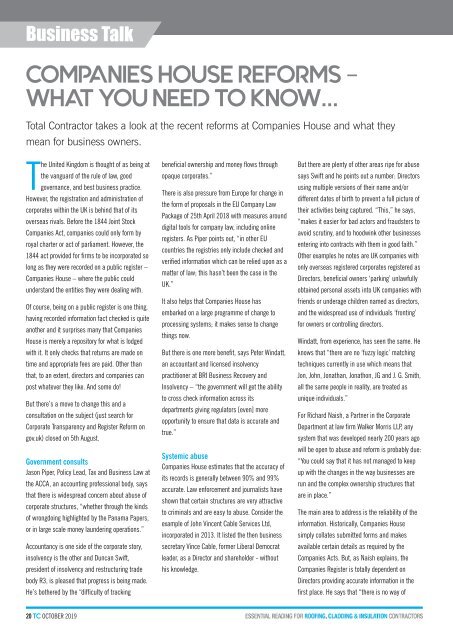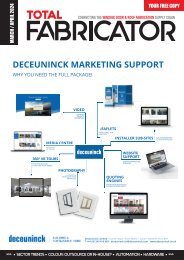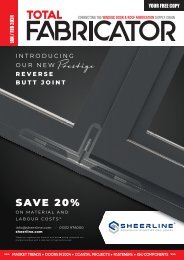October 2019
You also want an ePaper? Increase the reach of your titles
YUMPU automatically turns print PDFs into web optimized ePapers that Google loves.
Business Talk<br />
COMPANIES HOUSE REFORMS –<br />
WHAT YOU NEED TO KNOW...<br />
Total Contractor takes a look at the recent reforms at Companies House and what they<br />
mean for business owners.<br />
The United Kingdom is thought of as being at<br />
the vanguard of the rule of law, good<br />
governance, and best business practice.<br />
However, the registration and administration of<br />
corporates within the UK is behind that of its<br />
overseas rivals. Before the 1844 Joint Stock<br />
Companies Act, companies could only form by<br />
royal charter or act of parliament. However, the<br />
1844 act provided for firms to be incorporated so<br />
long as they were recorded on a public register –<br />
Companies House – where the public could<br />
understand the entities they were dealing with.<br />
Of course, being on a public register is one thing,<br />
having recorded information fact checked is quite<br />
another and it surprises many that Companies<br />
House is merely a repository for what is lodged<br />
with it. It only checks that returns are made on<br />
time and appropriate fees are paid. Other than<br />
that, to an extent, directors and companies can<br />
post whatever they like. And some do!<br />
But there’s a move to change this and a<br />
consultation on the subject (just search for<br />
Corporate Transparency and Register Reform on<br />
gov.uk) closed on 5th August.<br />
Government consults<br />
Jason Piper, Policy Lead, Tax and Business Law at<br />
the ACCA, an accounting professional body, says<br />
that there is widespread concern about abuse of<br />
corporate structures, “whether through the kinds<br />
of wrongdoing highlighted by the Panama Papers,<br />
or in large scale money laundering operations.”<br />
Accountancy is one side of the corporate story,<br />
insolvency is the other and Duncan Swift,<br />
president of insolvency and restructuring trade<br />
body R3, is pleased that progress is being made.<br />
He’s bothered by the “difficulty of tracking<br />
beneficial ownership and money flows through<br />
opaque corporates.”<br />
There is also pressure from Europe for change in<br />
the form of proposals in the EU Company Law<br />
Package of 25th April 2018 with measures around<br />
digital tools for company law, including online<br />
registers. As Piper points out, “in other EU<br />
countries the registries only include checked and<br />
verified information which can be relied upon as a<br />
matter of law; this hasn’t been the case in the<br />
UK.”<br />
It also helps that Companies House has<br />
embarked on a large programme of change to<br />
processing systems; it makes sense to change<br />
things now.<br />
But there is one more benefit, says Peter Windatt,<br />
an accountant and licensed insolvency<br />
practitioner at BRI Business Recovery and<br />
Insolvency – “the government will get the ability<br />
to cross check information across its<br />
departments giving regulators [even] more<br />
opportunity to ensure that data is accurate and<br />
true.”<br />
Systemic abuse<br />
Companies House estimates that the accuracy of<br />
its records is generally between 90% and 99%<br />
accurate. Law enforcement and journalists have<br />
shown that certain structures are very attractive<br />
to criminals and are easy to abuse. Consider the<br />
example of John Vincent Cable Services Ltd,<br />
incorporated in 2013. It listed the then business<br />
secretary Vince Cable, former Liberal Democrat<br />
leader, as a Director and shareholder - without<br />
his knowledge.<br />
But there are plenty of other areas ripe for abuse<br />
says Swift and he points out a number: Directors<br />
using multiple versions of their name and/or<br />
different dates of birth to prevent a full picture of<br />
their activities being captured. “This,” he says,<br />
“makes it easier for bad actors and fraudsters to<br />
avoid scrutiny, and to hoodwink other businesses<br />
entering into contracts with them in good faith.”<br />
Other examples he notes are UK companies with<br />
only overseas registered corporates registered as<br />
Directors, beneficial owners ‘parking’ unlawfully<br />
obtained personal assets into UK companies with<br />
friends or underage children named as directors,<br />
and the widespread use of individuals ‘fronting’<br />
for owners or controlling directors.<br />
Windatt, from experience, has seen the same. He<br />
knows that “there are no ‘fuzzy logic’ matching<br />
techniques currently in use which means that<br />
Jon, John, Jonathan, Jonathon, JG and J. G. Smith,<br />
all the same people in reality, are treated as<br />
unique individuals.”<br />
For Richard Naish, a Partner in the Corporate<br />
Department at law firm Walker Morris LLP, any<br />
system that was developed nearly 200 years ago<br />
will be open to abuse and reform is probably due:<br />
“You could say that it has not managed to keep<br />
up with the changes in the way businesses are<br />
run and the complex ownership structures that<br />
are in place.”<br />
The main area to address is the reliability of the<br />
information. Historically, Companies House<br />
simply collates submitted forms and makes<br />
available certain details as required by the<br />
Companies Acts. But, as Naish explains, the<br />
Companies Register is totally dependent on<br />
Directors providing accurate information in the<br />
first place. He says that “there is no way of<br />
20 TC OCTOBER <strong>2019</strong>

















